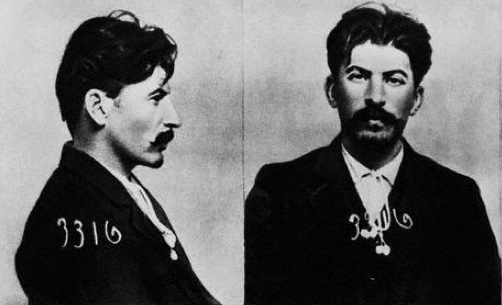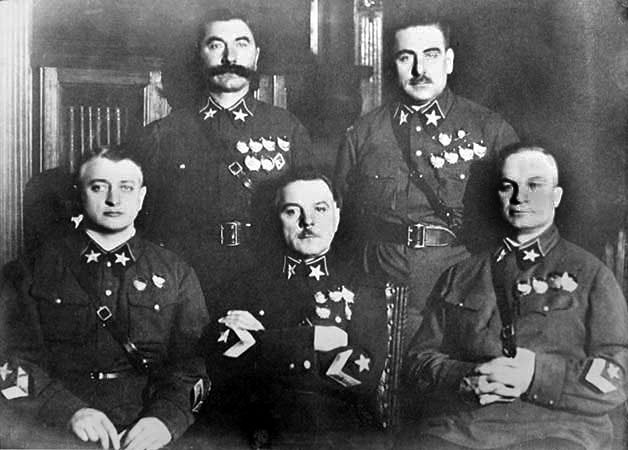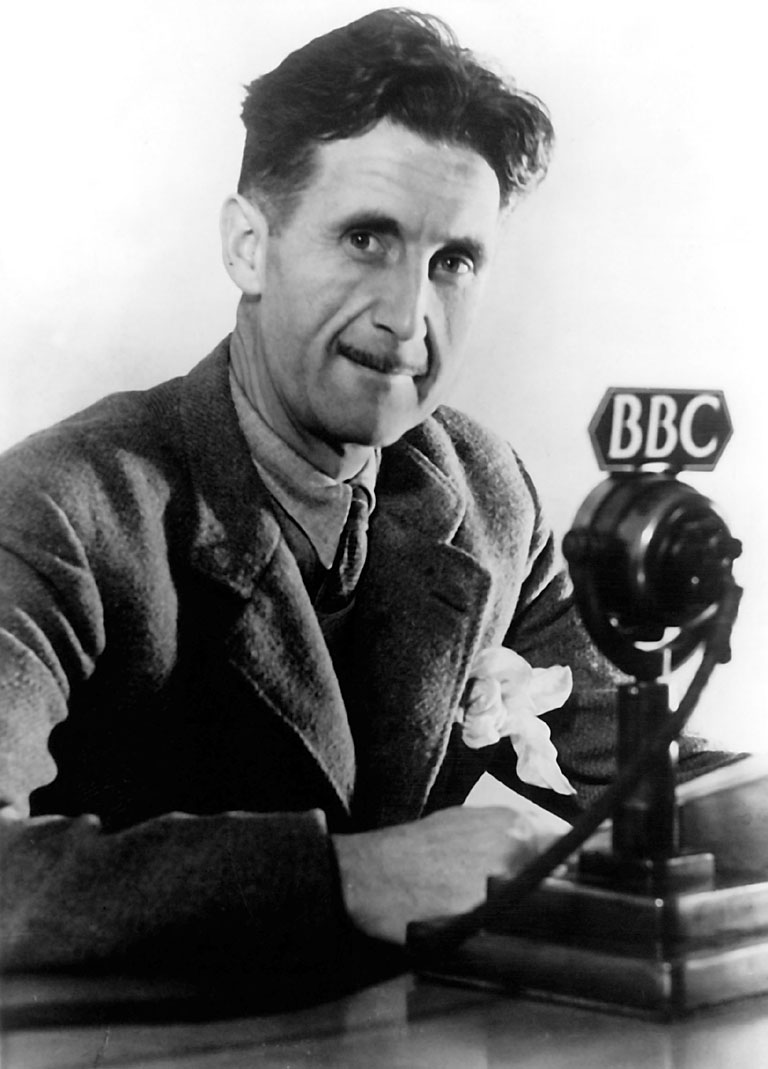
- Articles
The “Horrible Secret” and Orwell in Spain by Miguel A. Faria, MD
The historians John Costello and Oleg Tsarev contend that Joseph Stalin harbored a “horrible secret,” namely that as a young revolutionary the dictator had been an informant for the Tsarist secret police, the Okhrana. There is some evidence to support the claim that Stalin might have collaborated and informed on fellow revolutionaries prior to the October 1917 Russian Revolution but that contention remains sketchy and not totally convincing.

Suffice to say that as a result of this “secret” becoming known to several top communist Politburo and Soviet military leaders, Marshall Mikhail N. Tukhachevsky, a hero of the Soviet Union, and seven Red Army generals became involved in a plot to overthrow Stalin. In the minds of the conspirators, Stalin’s secret could have provided the needed justification for involvement in a coup d’état.
However, the conspirators were betrayed, and the ill-fated plot was nipped in the bud before it could come to fruition. On June 11, 1937, Moscovites were stunned to learn that Marshall Tukhachevsky and seven other generals had been arrested. Later that same day, a special military tribunal was convened that quickly convicted the “traitors.” On June 12, they were summarily executed for plotting a coup to rid Russia of one of the worst mass murderers in history, Joseph Stalin.
Yet, this episode contains another twist. Although Stalin’s henchmen in the NKVD were credited with unraveling the plot, behind the scenes they may have received assistance or disinformation, depending on one’s point of view, from the Nazi secret service.
Walter Schellenberg, head of the German Secret Service, revealed in his memoirs that SS Chief Reinhard Heydrich learned about Tukhachevsky’s plot to overthrow Stalin. Schellenberg wrote, “Heydrich at once grasped the tremendous importance of this piece of intelligence. If used correctly, a blow could be stuck at the leadership of the Red Army from which it would not recover for many years.” Schellenberg continued:
To unmask Tukhachevsky might be helping Stalin to strengthen his forces or might equally well push him into destroying a large part of his general staff. Hitler finally decided against Tukhachevsky and intervened in the affairs of the Soviet Union on Stalin’s side.
Schellenberg noted that the decision to expose the plot to Stalin was a major turning point in German-Soviet relations until Operation Barbarossa in 1941: “It eventually brought Germany into a temporary alliance with the Soviet Union and encouraged Hitler to attack the West before turning against Russia. Once Hitler made that decision, Heydrich of course supported him.”
For Heydrich, the goal of the destruction of the Soviet military leadership was accomplished. Heydrich’s gamble paid handsome dividends when Hitler launched Operation Barbarossa, at least initially.
In Stalin: The Court of the Red Tsar, Simon Sebag Montefiore summarized the episode:
The army had been the last force capable of stopping Stalin, reason enough for the destruction of its High Command. It is possible that the generals knew about Stalin’s record as an Okhrana double agent and had considered action. The usual explanation is that German disinformation persuaded Stalin that they were plotting a coup. Hitler’s spymaster, Heydrich, had concocted such evidence that was passed to Stalin by the well-meaning Czech President Beneš. But no German evidence was used at Tukhachevsky’s trial—nor was it necessary.
Stalin needed no evidence. He turned the NKVD loose on the Red Army and the purges escalated. Stalin will pay a price for decapitating the leadership of the Soviet Red Army.
Orwell and Homage To Catalonia
In the meantime, a naïve Englishman turned his attention to the hot issue in the Iberian Peninsula, the tinder box of the Spanish Civil War, where many young men indoctrinated by the progressive academicians thought they would be fighting fascism and prop up a republican government.
Homage To Catalonia is George Orwell’s memoir about his involvement in the Spanish Civil War as an English member of the 29th Division of the Party of Marxist Unification (POUM)—a radical socialist, internationalist organization, which was soon denounced by the Stalinist communists as being a “Trotskyite organization and Franco’s Fifth Column” because it contained a few internationalist Jewish members that followed Trotsky rather than Stalin in Marxist orthodoxy and world revolution. Orwell noted that “the charge was repeated over and over in the Communist Press, especially from the beginning of 1937 onwards. It was part of the world-wide drive of the official Communist Party against ‘Trotskyism,’ of which POUM was supposed to be representative in Spain,” adding that “anyone who criticizes Communist policy from a Left-wing standpoint is liable to be denounced as a Troskyist.”
Orwell wrote about the six-month period from late December 1936 to June 1937. During that time, he fought against Franco’s rebellious “fascist” army in the Aragon front of Catalonia, and he was seriously wounded by a shot fired from a sniper and described the incident: “Roughly speaking it was the sensation of being at the centre of an explosion. There seemed to be a loud bang and a blinding light all round me, and I felt a tremendous shock—no pain, only a violent shock, such as you get from an electric terminal…” The bullet entered and exited his neck causing considerable damage, and it took many weeks for him to recover. He was taken from the front to one facility and then transferred to another for medical care. After recuperating in various military hospitals, he returned to Barcelona.
In Barcelona, Orwell received his medical discharge papers, but also discovered a very troubling fact. Barcelona was now a changed city. Formerly, when the anarchists had been in power, there had been a jubilant, more relaxed, egalitarian, and revolutionary comradeship among people, army, workers, police, et cetera. Now, the situation had changed for the worse. Orwell stated that,
In Barcelona, during all those last weeks I spent there, there was a peculiar evil feeling in the air—an atmosphere of suspicion, fear, uncertainty, and veiled hatred…a perpetual vague sense of danger, a consciousness of some evil thing that was impending.
Former revolutionaries and militia members were being persecuted, accused of being Trotskyites, arrested, and many were being shot by the Soviet NKVD (or the subservient Spanish communist secret police) that were actively operating in “Republican” areas of Spain, prior to Franco’s victory. One of the chiefs of the secret NKVD “flying squads” of professional assassins was none other than Alexander Orlov.

Moreover, some socialist and even diversionary communist leaders were disappearing in dungeons or being executed. “On June 16, 1937, Andreu Nin Pérez and 40 other POUM leaders were arrested, their militia battalions were disbanded and their headquarters at the Hotel Falcon in Barcelona closed…POUM was promptly declared illegal.”
All POUM members were now being rounded up. Orwell was being sought merely for fighting with the socialist POUM battalion. Please note: Orwell was not having to escape from the fascists, but from his former communist comrades, who were eliminating their previous allies, the socialists and anarchists. Orwell related that, “The notion of ‘liquidating’ or ‘eliminating’ everyone who happens to disagree with you does not yet seem natural. It seemed only too natural in Barcelona. The ‘Stalinists’ were in the saddle, and therefore it was a matter of course.”
After a terrible ordeal of being pursued by his former leftist allies, George Orwell successfully escaped to France, and eventually made his way back to England.
Despite the trials and tribulations Orwell experienced during his brief six months in Spain, he made several observations that deserve mention. He noted that while the arrests, “were continuing without pause and the police seized suspected ‘Trotskyists,’ yet, as an Englishman, he maintained the “ineradicable English belief that ‘they’ cannot arrest you unless you have broken the law… a most dangerous belief to have during a political pogrom.”
Thus, the first priority of the Soviet communists controlling the Spanish government was not fighting Franco’s army but the extermination of anarchists and Trotskyites (mostly internationalist, Jewish socialist revolutionaries). The anarchists were considered enemies because their political philosophy was diametrically opposed to that of the communists, and they refused to give up their weapons.
After safely returning to England—that is, southern England and the tranquil environs of his childhood—George Orwell prophetically expressed concerns for coming world events: “Sometimes I fear that we shall never wake till we are jerked out of it by the roar of bombs.”
It is extremely fortuitous for the ones living in freedom that George Orwell, the author and the participant, survived the conflict with his eyes opened to the realities of socialism and communism. Orwell would go on to write Animal Farm and 1984, denouncing collectivism, totalitarianism, and communism. It was a mistake for the Stalinists to incorrectly label Orwell a Trotskyite merely because he had been assigned to an international socialist POUM battalion—but their mistake was a gain for liberty in general and literature in particular.
This article is excerpted from Dr. Faria’s book, Stalin, Mao, Communism, and the 21st Century Aftermath in Russia and China (2024)
Dr. Miguel A. Faria is Associate Editor in Chief in neuropsychiatry; and socioeconomics, politics, and world affairs of Surgical Neurology International (SNI). He is the author of numerous books, the most recent, Cuba’s Eternal Revolution through the Prism of Insurgency, Socialism, and Espionage (July 2023); Stalin, Mao, Communism, and the 21st Century Aftermath in Russia and China (2024); and Contrasting Ideals and Ends in the American and French Revolutions (in press)— the last four books by Cambridge Scholars Publishing, Newcastle upon Tyne, U.K.
This article may be cited as: Faria, MA. The “Horrible Secret” and Orwell in Spain, HaciendaPublishing.com, December 9, 2024. Available from: https://haciendapublishing.com/the-horrible-secret-and-orwell-in-spain-by-miguel-a-faria-md/.
Copyright ©2024 HaciendaPublishing.com